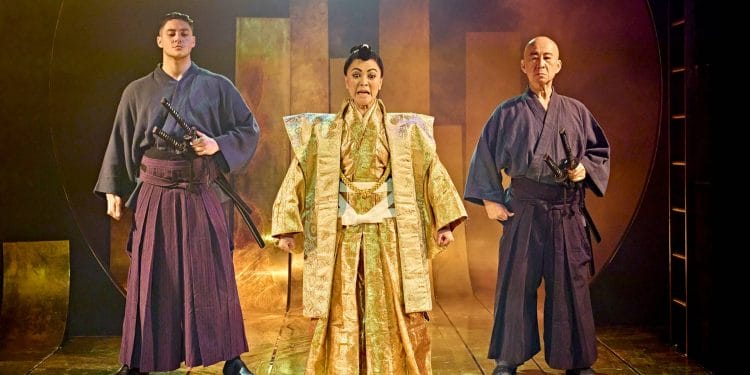 For all the Sondheim revivals that have graced stages all over the world, Pacific Overtures may be the one you’ve missed due to how rarely it’s produced. The original 1976 Broadway run, which featured music and lyrics that were unmistakably Sondheim, and a book by long-time collaborator John Weidman got mixed reviews and this production at Menier Chocolate Factory comes two decades since it was last seen in the UK.
For all the Sondheim revivals that have graced stages all over the world, Pacific Overtures may be the one you’ve missed due to how rarely it’s produced. The original 1976 Broadway run, which featured music and lyrics that were unmistakably Sondheim, and a book by long-time collaborator John Weidman got mixed reviews and this production at Menier Chocolate Factory comes two decades since it was last seen in the UK.
But this isn’t the original production. The Menier are co-producing with Umeda Arts Theater, and this version, revised by Weidman, successfully ran in Japan last year. It’s considerably shorter than the original, losing significant amounts of dialogue and even the song ‘Chrysanthemum Tea’ along with the character who sang it. These cuts potentially make a slicker production, but we also lose a lot of the history as well as character development, and all too often it feels like a staged concert rather than a full musical.
As we rush from one song into the next, the story starts to float off until finally it’s drifted too far to be saved. Our narrator is The Reciter (Jon Chew) who starts us off in a museum of Japanese artefacts and begins to tell us the true story of how, in 1853, the Americans attempted to enter the Island Empire of Japan – using force if necessary.
For 250 years prior, foreigners had not been allowed to set foot on the country’s sacred soil. Despite being written by Americans, Pacific Overtures is told from the Japanese point of view, and Matthew White’s production follows Sondheim and Weidman’s insistence that the cast be comprised, in the majority, of actors of Asian descent.
When Commodore Matthew C Perry sailed four warships into Japanese waters, in order to deliver a letter from President Fillmore, The Shogun (Saori Oda) dispatches the recently promoted Kayama to sail out and give the foreigners their marching orders. The new Prefect of Police at Uraga is aided by a shipwrecked fisherman, Manjiro, who has broken the law twice – firstly by leaving Japan, and secondly by returning.
Though told from the point of view of the Japanese, the writers don’t appear to be taking sides, instead using the story to highlight differences between East and West. Manjiro, who has spent ten years in Massachusetts, comments that his countrymen are calling the Americans barbarians, but he considers it to be the other way round.
There’s a large ensemble cast, considering the size of the stage, but it’s Takuro Ohno as Kayama and Joaquin Perdo Valdes who take the limelight. Ohno’s gentle and affecting performance beautifully complements Valdes’ more energetic and passionate portrayal of Manjiro, they work together brilliantly, and these two performances elevate the entire production.
It’s also beautifully designed, performed in traverse (which doesn’t always suit Sondheim), Paul Farnsworth’s set evokes pastel shades of ancient Japan, while sharp bronze lines and sliding panels create the sense of an empire. Projections on the floor create fishing lakes and splatters of blood from Samurai swords, the final scene which hints at Japan’s bustling technological future looks incredible and is a thrilling contrast to what has come before.
There’s a lot of it played for laughs, and it does veer into pantomime territory occasionally which seems to undermine the story being told, however the songs are really beautiful and often poetic, even by Sondheim standards these are complex but they sound great being played by the small band tucked away in a corner of the Menier space.
It is surprising that Pacific Overtures isn’t more well-known or as often produced, because it’s a captivating story with a really gorgeous score, ‘Someone in a Tree’ and ‘There is No Other Way’ are particular highlights. This revised version, despite being so successful in Japan, does seem to be missing something though, and that might not help this musical to eventually reach the prominence of other Sondheim works.

















